
RIVANEX 13.3 mg/24h TRANSDERMAL PATCHES
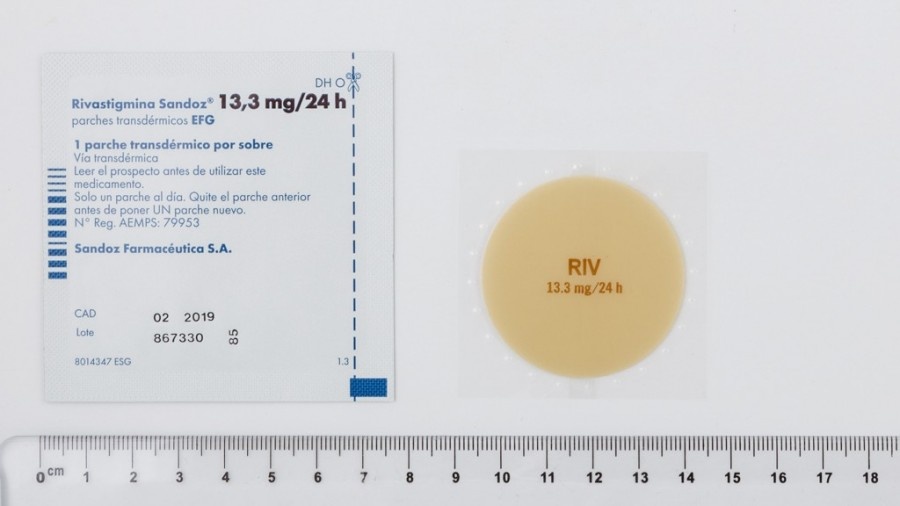

How to use RIVANEX 13.3 mg/24h TRANSDERMAL PATCHES
Translated with AI
This page provides general information and does not replace a doctor’s consultation. Always consult a doctor before taking any medication. Seek urgent medical care if symptoms are severe.
Show originalContents of the leaflet
Introduction
Package Leaflet: Information for the Patient
Rivanex 13.3 mg/24h Transdermal Patches EFG
Rivastigmine
Read the entire package leaflet carefully before starting to take this medication, as it contains important information for you.
- Keep this package leaflet, as you may need to read it again.
- If you have any questions, consult your doctor or pharmacist.
- This medication has been prescribed to you only, and you should not give it to others, even if they have the same symptoms as you, as it may harm them.
- If you experience side effects, consult your doctor or pharmacist, even if they are side effects not listed in this package leaflet. See section 4.
Contents of the Package Leaflet
- What is Rivanex and what is it used for
- What you need to know before taking Rivanex
- How to take Rivanex
- Possible side effects
- Storage of Rivanex
- Contents of the pack and further information
1. What is Rivanex and what is it used for
The active substance of Rivanex patches is rivastigmine.
Rivastigmine belongs to the group of cholinesterase inhibitors. In patients with Alzheimer's dementia, certain nerve cells die in the brain, causing low levels of the neurotransmitter acetylcholine (a substance that allows nerve cells to communicate with each other). Rivastigmine acts by blocking the enzymes that break down acetylcholine: acetylcholinesterase and butyrylcholinesterase. By blocking these enzymes, Rivanex allows the increase of acetylcholine in the brain, helping to reduce the symptoms of Alzheimer's disease.
Rivanex is used for the treatment of adult patients with mild to moderately severe Alzheimer's dementia, a progressive brain disorder that gradually affects memory, intellectual ability, and behavior.
2. What you need to know before taking Rivanex
Do not use Rivanex:
- if you are allergic to rivastigmine or any of the other components of this medication (listed in section 6).
- if you have ever had an allergic reaction to a similar medication (carbamate derivatives).
- if you have a skin reaction that extends beyond the size of the patch, if there is a more intense local reaction (such as blisters, increased skin inflammation, swelling) and if there is no improvement during the 48 hours after removing the transdermal patch.
If you are in any of these situations, inform your doctor and do not use rivastigmine.
Warnings and precautions
Consult your doctor before starting to use this medication:
- if you have or have ever had an irregular or slow heart rate (pulse).
- if you have or have ever had an active stomach ulcer.
- if you have or have ever had difficulty urinating.
- if you have or have ever had seizures.
- if you have or have ever had asthma or severe respiratory disease.
- if you suffer from tremors.
- if you have low body weight.
- if you have gastrointestinal reactions such as a feeling of nausea (nausea), vomiting (vomiting) and diarrhea. You may become dehydrated (lose a large amount of fluids) if vomiting or diarrhea is prolonged.
- if you have liver problems (liver failure).
If you are in any of these situations, your doctor may consider it necessary to monitor you more closely while you are being treated.
If you have not used the patches for several days, do not put on another one without first consulting your doctor.
Children and adolescents
Rivastigmine should not be used in the pediatric population for the treatment of Alzheimer's disease.
Other medications and Rivanex
Inform your doctor or pharmacist if you are using, have recently used, or may need to use any other medication.
Rivastigmine may interfere with anticholinergic medications, some of which are medications used to relieve stomach cramps or spasms (e.g., dicyclomine), for the treatment of Parkinson's disease (e.g., amantadine) or to prevent motion sickness (e.g., diphenhydramine, scopolamine, or meclizine).
This medication should not be administered at the same time as metoclopramide (a medication used to relieve or prevent nausea and vomiting). Taking the two medications together may cause problems such as stiffness in the limbs and hand tremors.
In case you need to undergo surgery while using rivastigmine, inform your doctor that you are using it, as it may potentiate the effects of some muscle relaxants in anesthesia.
Care should be taken when using this medication with beta-blockers (medications such as atenolol used to treat hypertension, angina, and other heart conditions). Taking the two medications together may cause complications such as a decrease in heart rate (bradycardia) that can lead to fainting or loss of consciousness.
Using Rivanex with food, drinks, and alcohol
This medication can be used with food, drinks, and alcohol.
Pregnancy, breastfeeding, and fertility
If you are pregnant or breastfeeding, think you may be pregnant, or plan to become pregnant, consult your doctor or pharmacist before using this medication.
If you are pregnant, it is necessary to evaluate the benefits of using rivastigmine against the possible adverse effects for the fetus. This medication should not be used during pregnancy unless it is clearly necessary.
You should not breastfeed during treatment with rivastigmine.
Driving and using machines
Your illness may affect your ability to drive or use machinery, and you should not engage in these activities unless your doctor indicates that it is safe to do so.
Rivanex patches may cause dizziness and drowsiness, mainly at the start of treatment or when increasing the dose. If you experience these effects, you should not drive or use machinery.
3. How to take Rivanex
Follow the administration instructions of this medication exactly as indicated by your doctor. In case of doubt, consult your doctor or pharmacist again.
Important:
- Remove the previous patch before applying a new one.
- Only one patch per day.
- Do not cut the patch into pieces.
- Press the patch firmly against the skin with the palm of your hand for at least 30 seconds.
How to start treatment
Your doctor will indicate the most suitable dose of rivastigmine for your case.
- Treatment is usually started with rivastigmine 4.6 mg/24 h.
- The recommended daily dose is rivastigmine 9.5 mg/24 h. If this dose is well tolerated, the treating doctor may consider increasing it to 13.3 mg/24 h.
- Only wear one rivastigmine patch at a time and replace the patch with a new one after 24 hours.
During treatment, your doctor may adjust the dose depending on your individual needs.
If you have not used the patches for three days, do not put on another one without first consulting your doctor. Treatment with the transdermal patch can be restarted at the same dose if it has not been interrupted for more than three days. Otherwise, your doctor will have you restart your treatment with rivastigmine 4.6 mg/24 h.
Where to apply your Rivanex transdermal patch
- Before applying a patch, make sure the skin is clean, dry, and hairless, without powders, oils, moisturizers, or lotions that may prevent the patch from sticking well to the skin, without cuts, redness, or irritation.
- Carefully remove any patch you are wearing before applying a new one. Wearing multiple patches on your body could expose you to an excessive amount of this medication and this could be potentially dangerous.
- Applyonly onepatch per day to oneof the possible areas as shown in the following diagrams:
- Upper left or upper right arm
- Upper left or upper right chest (avoiding the breasts in women)
- Upper left or upper right back
- Lower left or lower right back
Every 24 hours, remove the previous patch before applying a new patch to onlyoneof the following possible areas.
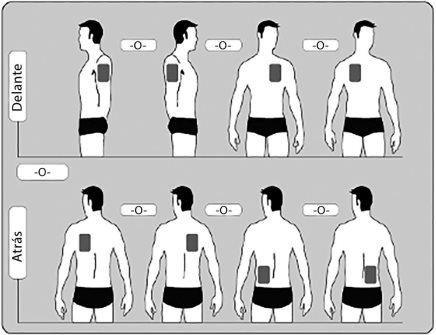
Each time you change the patch, you must remove the previous day's patch before applying the new patch to a different area of the skin (e.g., one day on the right side of the body and the next day on the left side; or one day on the upper part of the body and the next day on the lower part). Wait at least 14 days before applying a new patch to exactly the same area of skin.
How to apply Rivanex transdermal patches
Rivanex patches are thin, opaque plastic and stick to the skin. Each patch is in a protective pouch that protects it until it is applied. Do not open the pouch or remove the patch until you are ready to apply it.
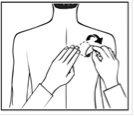
Carefully remove the existing patch before applying a new one.
Patients who are starting treatment for the first time and patients who are restarting treatment with Rivanex after interrupting treatment should start with the second figure.

Each patch is in an individual protective pouch. Only open the pouch when you are ready to apply the patch. Cut the pouch along the dotted line with scissors and remove the patch from the pouch.
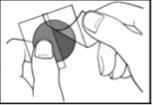
A protective film covers the adhesive side of the patch. Remove the first sheet of the film without touching the adhesive side of the patch with your fingers.
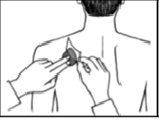
Place the adhesive side of the patch on the upper or lower back or on the upper arm or chest and then remove the second sheet of the protective film.
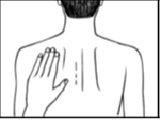
Press the patch firmly against the skin with the palm of your hand for at least 30 seconds and make sure the edges are well stuck.
If it helps, you can write on the patch, for example, the day of the week, with a fine-tip pen.
You should wear the patch continuously until it is time to change it for a new one. When you apply a new patch, you can try different areas to find the ones that are most comfortable for you and where clothing does not rub against the patch.
How to remove Rivanex transdermal patches
Gently pull one of the edges of the patch to slowly detach it from the skin. If there are any adhesive residues on the skin, soak the area with warm water and mild soap or use baby oil to remove it. Do not use alcohol or other solvents (nail polish removers or other solvents).
After removing the patch, wash your hands with soap and water. In case of contact with the eyes or if the eyes become red after handling the patch, wash immediatelywith plenty of water and seek medical advice if the symptoms do not resolve.
Can you wear Rivanex transdermal patches when bathing, swimming, or exposing yourself to the sun?
- Bathing, swimming, or showering should not affect the patch. Make sure it does not come off partially while performing these activities.
- Do not expose the patch to an external heat source (e.g., excessive sunlight, sauna, sunbed) for long periods.
What to do if a patch falls off
If a patch falls off, apply a new one for the rest of that day and change it the next day at the usual time.
When and for how long should you wear Rivanex transdermal patches
- To benefit from treatment, apply a new patch every day, preferably at the same time.
- Only wear one Rivanex patch at a time and replace the patch with a new one after 24 hours.
If you use more Rivanex than you should
If you have accidentally applied more than one patch, remove all patches from the skin, consult your doctor or pharmacist immediately, or call the Toxicology Information Service, phone: 91 562 04 20, indicating the medication. Some people who have accidentally taken excessive amounts of rivastigmine have experienced nausea (nausea), vomiting, diarrhea, high blood pressure, and hallucinations. There may also be a slowing of the heart rate and fainting.
If you forget to use Rivanex
If you realize you have forgotten to apply a patch, apply it immediately. The next day, apply the next patch at the usual time. Do not apply two patches to make up for the one you forgot.
If you interrupt treatment with Rivanex
Inform your doctor or pharmacist if you stop using the patches.
If you have any other questions about the use of this medication, ask your doctor or pharmacist.
4. Possible side effects
Like all medications, this medication can cause side effects, although not everyone will experience them.
You may experience side effects more frequently when starting your treatment or when your dose is increased. Generally, side effects will slowly disappear as your body gets used to the medication.
If you notice any of the following side effects that may be serious, remove the patch and inform your doctor immediately:
Common (may affect up to 1 in 10 people)
- Loss of appetite.
- Feeling of dizziness.
- Feeling of agitation or numbness.
- Urinary incontinence (inability to properly control urine).
Uncommon (may affect up to 1 in 100 people)
- Heart rate problems such as slow heart rate.
- Seeing things that do not really exist (hallucinations)
- Stomach ulcer.
- Dehydration (loss of a large amount of fluids).
- Hyperactivity (high level of activity, restlessness).
- Aggressiveness.
Rare (may affect up to 1 in 1,000 people)
- Falls.
Very rare (may affect up to 1 in 10,000 people)
- Stiffness in the arms and legs.
- Tremor in the hands.
Frequency not known (cannot be estimated from the available data)
- Allergic reaction where the patch was applied, such as blisters or skin inflammation.
- Worsening of Parkinson's disease symptoms – such as tremor, stiffness, and difficulty moving.
- Pancreatitis – signs include severe pain in the upper part of the stomach, often accompanied by nausea (nausea) or vomiting.
- Fast or irregular heart rate.
- High blood pressure
- Seizures (convulsions).
- Liver disorders (yellowing of the skin, yellowing of the whites of the eyes, abnormal darkening of urine or unexplained nausea, vomiting, fatigue, and loss of appetite).
- Changes in tests that show liver function.
- Feeling of restlessness.
- Nightmares
- Pisa syndrome (a condition that involves involuntary muscle contraction and abnormal tilting of the body and head to one side).
If you notice any of the above side effects, remove the patch and inform your doctor immediately.
Other side effects experienced with rivastigmine capsules or oral solution and that may occur with patches:
Common (may affect up to 1 in 10 people)
- Excessive saliva.
- Loss of appetite
- Feeling of agitation
- Feeling of general discomfort.
- Tremor or feeling of confusion.
- Increased sweating.
Uncommon (may affect up to 1 in 100 people)
- Irregular heart rate (e.g., fast heart rate)
- Difficulty sleeping
- Accidental falls
Rare (may affect up to 1 in 1,000 people)
- Ulcer in the intestine.
- Seizures (convulsions)
- Chest pain – probably caused by spasm in the heart.
Very rare (may affect up to 1 in 10,000 people)
- Gastrointestinal bleeding – manifested as blood in the stool or when vomiting.
- High blood pressure
- Pancreatitis – signs include severe pain in the upper part of the stomach, often accompanied by nausea (nausea) or vomiting.
- Gastrointestinal bleeding – manifested as blood in the stool or when vomiting
- Seeing things that do not exist (hallucinations)
- Some people who have been intensely nauseated (vomiting) have had a tear in part of the digestive tube that connects the mouth to the stomach (esophagus)
Reporting side effects
If you experience any type of side effect, consult your doctor or pharmacist, even if it is a possible side effect not listed in this package leaflet. You can also report them directly through the Spanish Pharmacovigilance System for Human Use Medications, https://www.notificaRAM.es. By reporting side effects, you can contribute to providing more information on the safety of this medication.
5. Storage of Rivanex
This medication does not require any special storage temperature. Keep in the original packaging to protect it from light. Store the transdermal patch in the pouch until use.
Keep this medication out of sight and reach of children.
Do not use this medication after the expiration date shown on the box and pouch. The expiration date is the last day of the indicated month.
Do not use any patch if you notice it is damaged or shows signs of tampering.
After removing a patch, fold it in half with the adhesive side inward and press. After placing it in the original pouch, when disposing of the patch, make sure it is out of the reach of children. After removing the patch, do not touch your eyes, and wash your hands well with soap and water.
Medications should not be thrown away in drains or trash. Deposit the packaging and medications you no longer need at the SIGRE Point of the pharmacy. In case of doubt, ask your pharmacist how to dispose of the packaging and medications you no longer need. This way, you will help protect the environment.
6. Package Contents and Additional Information
Composition ofRivanex
The active ingredient is rivastigmine. Each patch releases 13.3 mg of rivastigmine in 24 hours, measures 15 cm2, and contains 27 mg of rivastigmine.
The other components are: outer layer [polyester film, silicone-coated polyester film, fluorinated polyester film], adhesive matrix [acrylic adhesive (DURO-TAK87-235A), acrylate copolymer (PLASTOID B), and ethyl acetate], adhesive layer [silicone adhesive (BIO-PSA 7-4302)], and ink.
Appearance of the Product and Package Contents
Rivanex 13.3 mg/24 h transdermal patches are presented in the form of a transdermal patch composed of three layers. The outer layer has a rounded shape. Each pouch contains one transdermal patch.
Rivanex 13.3 mg/24 h transdermal patches are available in packages containing 60 pouches.
Marketing Authorization Holder and Manufacturer
Marketing Authorization Holder
NEURAXPHARM SPAIN, S.L.U.
Avda. Barcelona, 69
08970 Sant Joan Despí - (Barcelona)
Spain
Manufacturer
Eurofins PHAST GmbH
Kardinal-Wendel-Strasse 16,
66424 Homburg,
Germany
Date of the Last Revision of this Leaflet: January 2025
Other Sources of Information
Detailed and updated information on this medication is available on the website of the Spanish Agency for Medicines and Health Products (AEMPS) http://www.aemps.gob.es/
- Country of registration
- Active substance
- Prescription requiredYes
- Manufacturer
- This information is for reference only and does not constitute medical advice. Always consult a doctor before taking any medication. Oladoctor is not responsible for medical decisions based on this content.
- Alternatives to RIVANEX 13.3 mg/24h TRANSDERMAL PATCHESDosage form: TRANSDERMAL PATCH, 13.3 mg/24 hActive substance: rivastigmineManufacturer: Esteve Pharmaceuticals S.A.Prescription requiredDosage form: TRANSDERMAL PATCH, 4.6 mg/24 hActive substance: rivastigmineManufacturer: Esteve Pharmaceuticals S.A.Prescription requiredDosage form: TRANSDERMAL PATCH, 9.5 mg/24 hActive substance: rivastigmineManufacturer: Esteve Pharmaceuticals S.A.Prescription required
Online doctors for RIVANEX 13.3 mg/24h TRANSDERMAL PATCHES
Discuss questions about RIVANEX 13.3 mg/24h TRANSDERMAL PATCHES, including use, safety considerations and prescription review, subject to medical assessment and local regulations.
Frequently Asked Questions













